Ethical Leadership: Personal Traits, Styles, and Organizational Impact
VerifiedAdded on 2022/08/27
|12
|3167
|40
Essay
AI Summary
This essay delves into the multifaceted realm of ethical leadership, examining the personal traits and leadership styles of a successful leader. It explores the strengths and weaknesses of the author's own leadership approach, emphasizing communication, duty orientation, and ethical decision-making. The essay contrasts these strengths with areas for improvement, such as assertiveness and self-confidence. Furthermore, it discusses the importance of cognitive factors, emotional intelligence, and the impact of motives on leadership effectiveness. The essay also analyzes the application of social justice perspectives within an organization and reflects on the lessons learned from personal experiences, including the adoption of a democratic leadership style and the handling of organizational risks. The author concludes by highlighting the importance of adaptability and ethical conduct in fostering a positive and effective work environment.
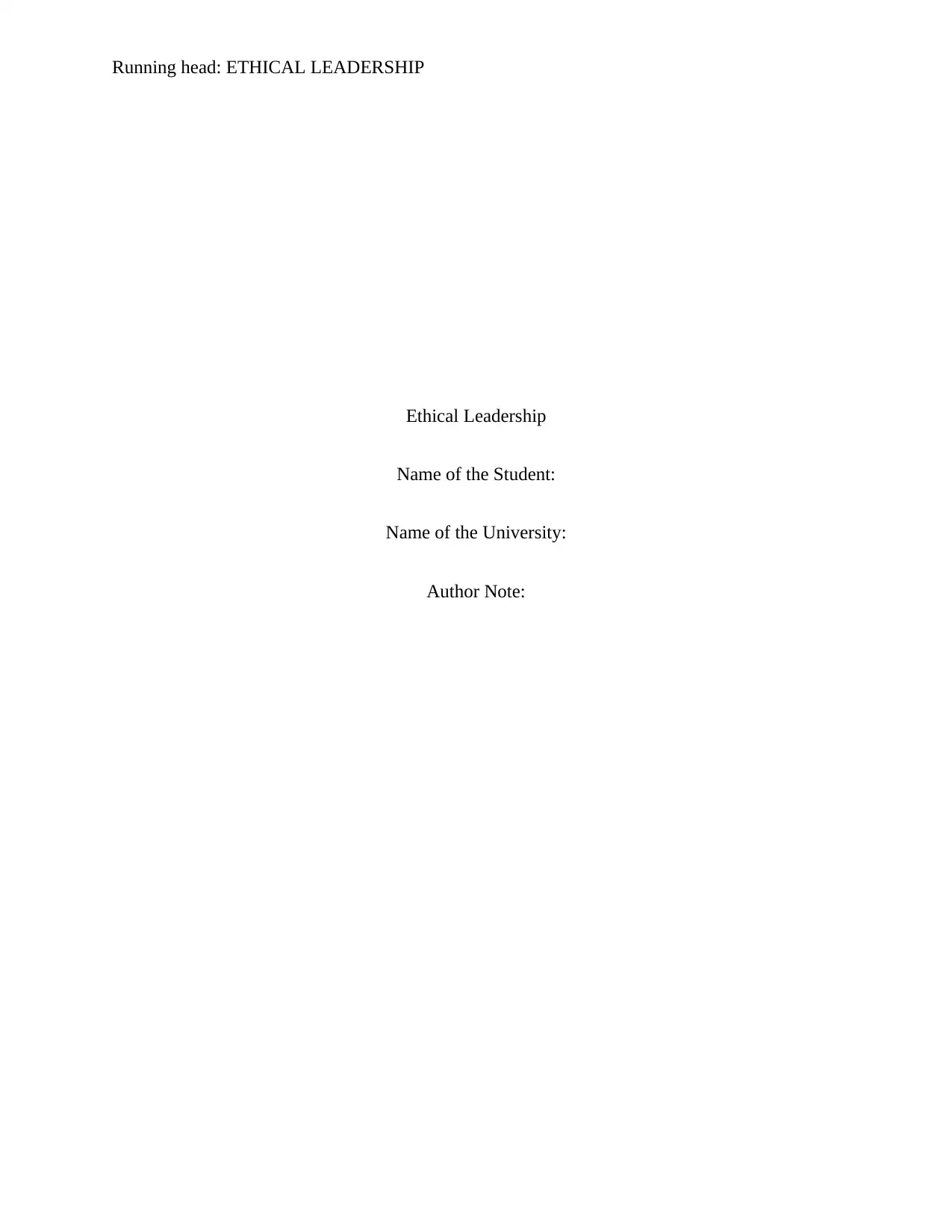
Running head: ETHICAL LEADERSHIP
Ethical Leadership
Name of the Student:
Name of the University:
Author Note:
Ethical Leadership
Name of the Student:
Name of the University:
Author Note:
Paraphrase This Document
Need a fresh take? Get an instant paraphrase of this document with our AI Paraphraser
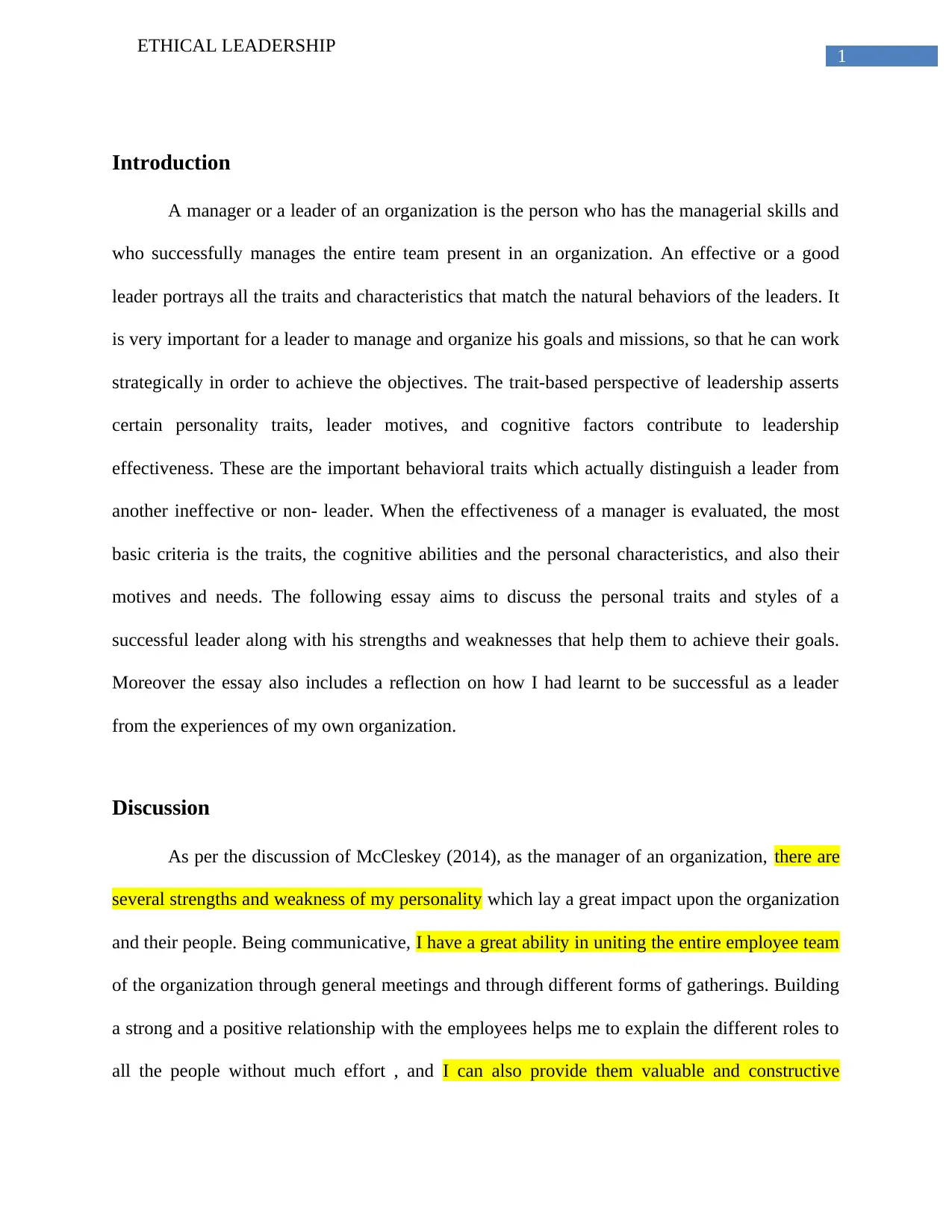
1
ETHICAL LEADERSHIP
Introduction
A manager or a leader of an organization is the person who has the managerial skills and
who successfully manages the entire team present in an organization. An effective or a good
leader portrays all the traits and characteristics that match the natural behaviors of the leaders. It
is very important for a leader to manage and organize his goals and missions, so that he can work
strategically in order to achieve the objectives. The trait-based perspective of leadership asserts
certain personality traits, leader motives, and cognitive factors contribute to leadership
effectiveness. These are the important behavioral traits which actually distinguish a leader from
another ineffective or non- leader. When the effectiveness of a manager is evaluated, the most
basic criteria is the traits, the cognitive abilities and the personal characteristics, and also their
motives and needs. The following essay aims to discuss the personal traits and styles of a
successful leader along with his strengths and weaknesses that help them to achieve their goals.
Moreover the essay also includes a reflection on how I had learnt to be successful as a leader
from the experiences of my own organization.
Discussion
As per the discussion of McCleskey (2014), as the manager of an organization, there are
several strengths and weakness of my personality which lay a great impact upon the organization
and their people. Being communicative, I have a great ability in uniting the entire employee team
of the organization through general meetings and through different forms of gatherings. Building
a strong and a positive relationship with the employees helps me to explain the different roles to
all the people without much effort , and I can also provide them valuable and constructive
ETHICAL LEADERSHIP
Introduction
A manager or a leader of an organization is the person who has the managerial skills and
who successfully manages the entire team present in an organization. An effective or a good
leader portrays all the traits and characteristics that match the natural behaviors of the leaders. It
is very important for a leader to manage and organize his goals and missions, so that he can work
strategically in order to achieve the objectives. The trait-based perspective of leadership asserts
certain personality traits, leader motives, and cognitive factors contribute to leadership
effectiveness. These are the important behavioral traits which actually distinguish a leader from
another ineffective or non- leader. When the effectiveness of a manager is evaluated, the most
basic criteria is the traits, the cognitive abilities and the personal characteristics, and also their
motives and needs. The following essay aims to discuss the personal traits and styles of a
successful leader along with his strengths and weaknesses that help them to achieve their goals.
Moreover the essay also includes a reflection on how I had learnt to be successful as a leader
from the experiences of my own organization.
Discussion
As per the discussion of McCleskey (2014), as the manager of an organization, there are
several strengths and weakness of my personality which lay a great impact upon the organization
and their people. Being communicative, I have a great ability in uniting the entire employee team
of the organization through general meetings and through different forms of gatherings. Building
a strong and a positive relationship with the employees helps me to explain the different roles to
all the people without much effort , and I can also provide them valuable and constructive
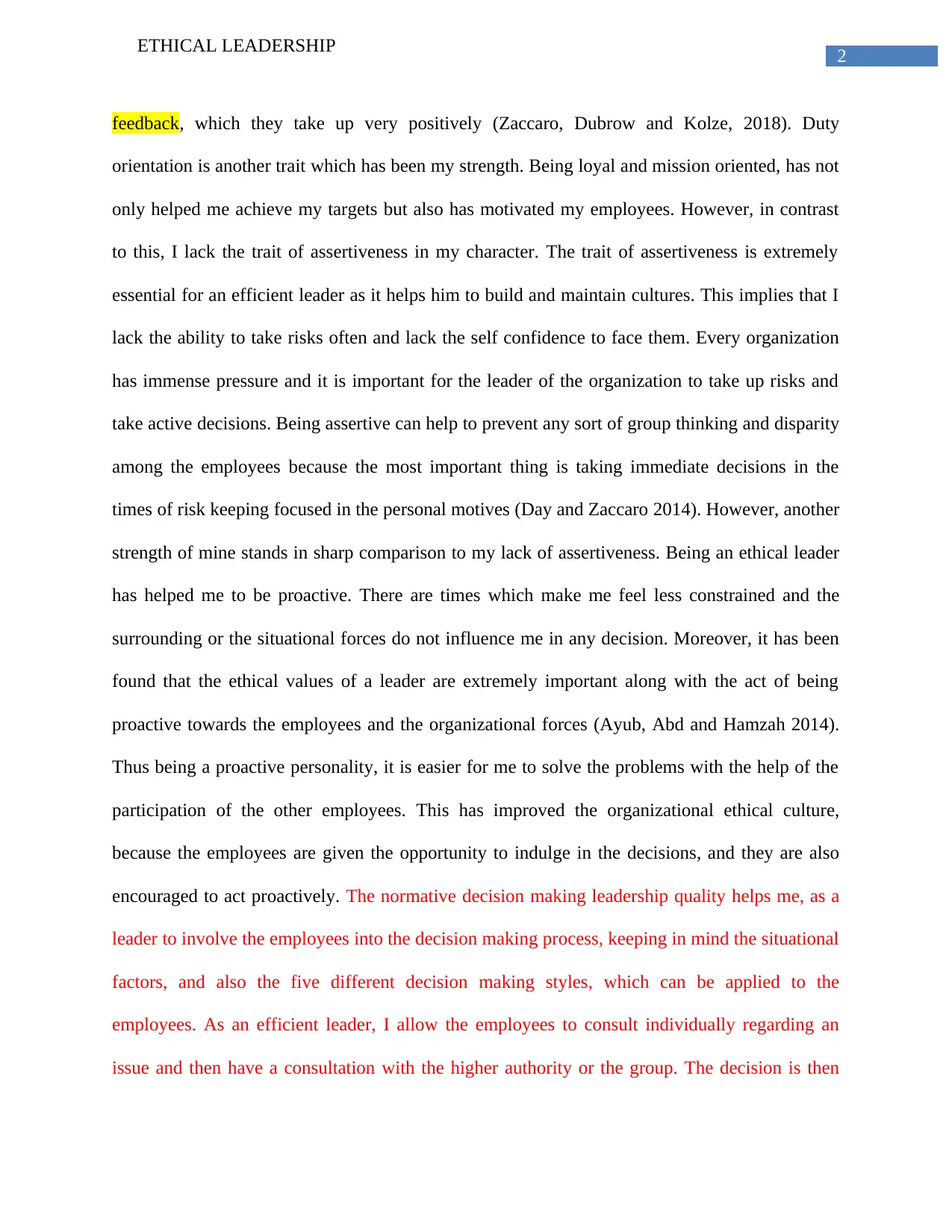
2
ETHICAL LEADERSHIP
feedback, which they take up very positively (Zaccaro, Dubrow and Kolze, 2018). Duty
orientation is another trait which has been my strength. Being loyal and mission oriented, has not
only helped me achieve my targets but also has motivated my employees. However, in contrast
to this, I lack the trait of assertiveness in my character. The trait of assertiveness is extremely
essential for an efficient leader as it helps him to build and maintain cultures. This implies that I
lack the ability to take risks often and lack the self confidence to face them. Every organization
has immense pressure and it is important for the leader of the organization to take up risks and
take active decisions. Being assertive can help to prevent any sort of group thinking and disparity
among the employees because the most important thing is taking immediate decisions in the
times of risk keeping focused in the personal motives (Day and Zaccaro 2014). However, another
strength of mine stands in sharp comparison to my lack of assertiveness. Being an ethical leader
has helped me to be proactive. There are times which make me feel less constrained and the
surrounding or the situational forces do not influence me in any decision. Moreover, it has been
found that the ethical values of a leader are extremely important along with the act of being
proactive towards the employees and the organizational forces (Ayub, Abd and Hamzah 2014).
Thus being a proactive personality, it is easier for me to solve the problems with the help of the
participation of the other employees. This has improved the organizational ethical culture,
because the employees are given the opportunity to indulge in the decisions, and they are also
encouraged to act proactively. The normative decision making leadership quality helps me, as a
leader to involve the employees into the decision making process, keeping in mind the situational
factors, and also the five different decision making styles, which can be applied to the
employees. As an efficient leader, I allow the employees to consult individually regarding an
issue and then have a consultation with the higher authority or the group. The decision is then
ETHICAL LEADERSHIP
feedback, which they take up very positively (Zaccaro, Dubrow and Kolze, 2018). Duty
orientation is another trait which has been my strength. Being loyal and mission oriented, has not
only helped me achieve my targets but also has motivated my employees. However, in contrast
to this, I lack the trait of assertiveness in my character. The trait of assertiveness is extremely
essential for an efficient leader as it helps him to build and maintain cultures. This implies that I
lack the ability to take risks often and lack the self confidence to face them. Every organization
has immense pressure and it is important for the leader of the organization to take up risks and
take active decisions. Being assertive can help to prevent any sort of group thinking and disparity
among the employees because the most important thing is taking immediate decisions in the
times of risk keeping focused in the personal motives (Day and Zaccaro 2014). However, another
strength of mine stands in sharp comparison to my lack of assertiveness. Being an ethical leader
has helped me to be proactive. There are times which make me feel less constrained and the
surrounding or the situational forces do not influence me in any decision. Moreover, it has been
found that the ethical values of a leader are extremely important along with the act of being
proactive towards the employees and the organizational forces (Ayub, Abd and Hamzah 2014).
Thus being a proactive personality, it is easier for me to solve the problems with the help of the
participation of the other employees. This has improved the organizational ethical culture,
because the employees are given the opportunity to indulge in the decisions, and they are also
encouraged to act proactively. The normative decision making leadership quality helps me, as a
leader to involve the employees into the decision making process, keeping in mind the situational
factors, and also the five different decision making styles, which can be applied to the
employees. As an efficient leader, I allow the employees to consult individually regarding an
issue and then have a consultation with the higher authority or the group. The decision is then
⊘ This is a preview!⊘
Do you want full access?
Subscribe today to unlock all pages.

Trusted by 1+ million students worldwide
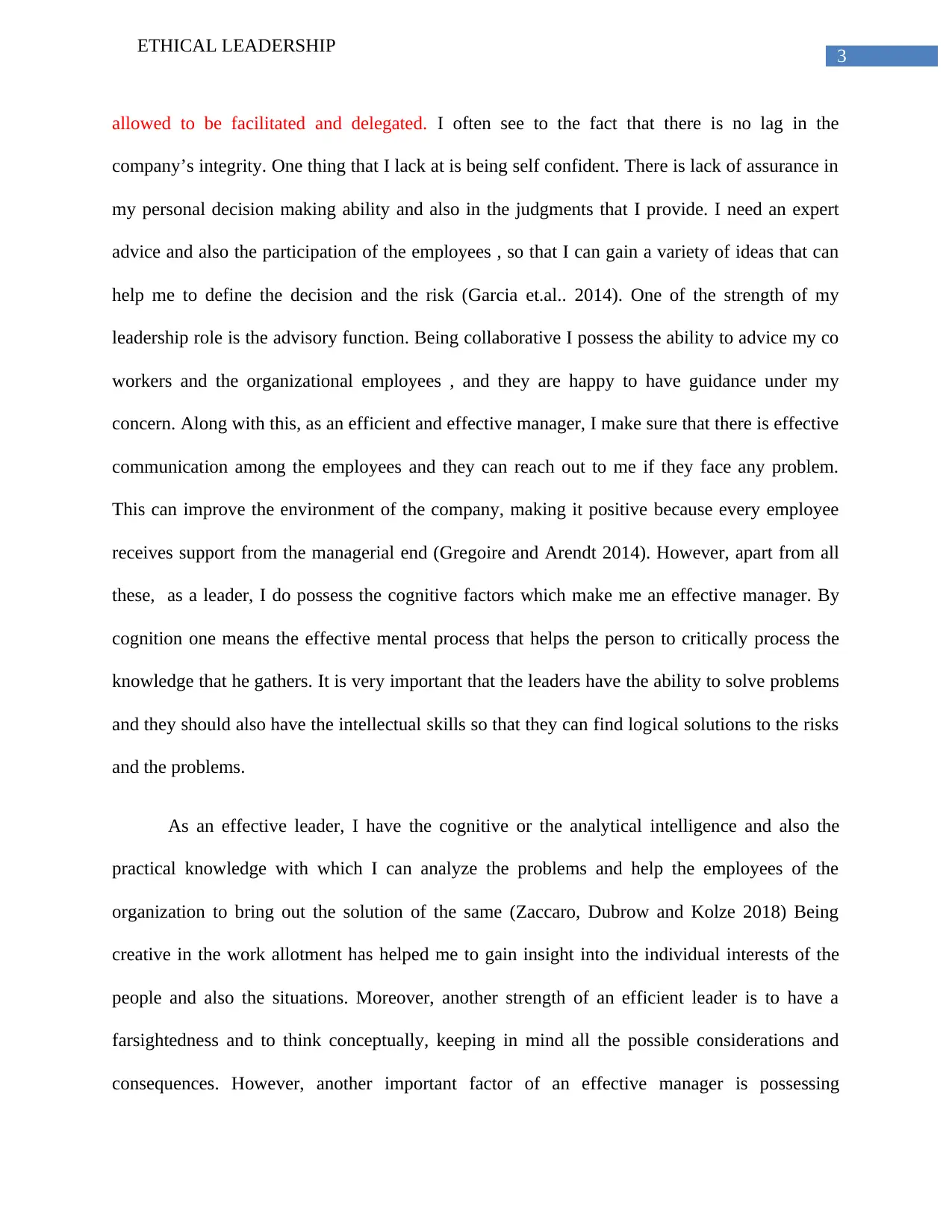
3
ETHICAL LEADERSHIP
allowed to be facilitated and delegated. I often see to the fact that there is no lag in the
company’s integrity. One thing that I lack at is being self confident. There is lack of assurance in
my personal decision making ability and also in the judgments that I provide. I need an expert
advice and also the participation of the employees , so that I can gain a variety of ideas that can
help me to define the decision and the risk (Garcia et.al.. 2014). One of the strength of my
leadership role is the advisory function. Being collaborative I possess the ability to advice my co
workers and the organizational employees , and they are happy to have guidance under my
concern. Along with this, as an efficient and effective manager, I make sure that there is effective
communication among the employees and they can reach out to me if they face any problem.
This can improve the environment of the company, making it positive because every employee
receives support from the managerial end (Gregoire and Arendt 2014). However, apart from all
these, as a leader, I do possess the cognitive factors which make me an effective manager. By
cognition one means the effective mental process that helps the person to critically process the
knowledge that he gathers. It is very important that the leaders have the ability to solve problems
and they should also have the intellectual skills so that they can find logical solutions to the risks
and the problems.
As an effective leader, I have the cognitive or the analytical intelligence and also the
practical knowledge with which I can analyze the problems and help the employees of the
organization to bring out the solution of the same (Zaccaro, Dubrow and Kolze 2018) Being
creative in the work allotment has helped me to gain insight into the individual interests of the
people and also the situations. Moreover, another strength of an efficient leader is to have a
farsightedness and to think conceptually, keeping in mind all the possible considerations and
consequences. However, another important factor of an effective manager is possessing
ETHICAL LEADERSHIP
allowed to be facilitated and delegated. I often see to the fact that there is no lag in the
company’s integrity. One thing that I lack at is being self confident. There is lack of assurance in
my personal decision making ability and also in the judgments that I provide. I need an expert
advice and also the participation of the employees , so that I can gain a variety of ideas that can
help me to define the decision and the risk (Garcia et.al.. 2014). One of the strength of my
leadership role is the advisory function. Being collaborative I possess the ability to advice my co
workers and the organizational employees , and they are happy to have guidance under my
concern. Along with this, as an efficient and effective manager, I make sure that there is effective
communication among the employees and they can reach out to me if they face any problem.
This can improve the environment of the company, making it positive because every employee
receives support from the managerial end (Gregoire and Arendt 2014). However, apart from all
these, as a leader, I do possess the cognitive factors which make me an effective manager. By
cognition one means the effective mental process that helps the person to critically process the
knowledge that he gathers. It is very important that the leaders have the ability to solve problems
and they should also have the intellectual skills so that they can find logical solutions to the risks
and the problems.
As an effective leader, I have the cognitive or the analytical intelligence and also the
practical knowledge with which I can analyze the problems and help the employees of the
organization to bring out the solution of the same (Zaccaro, Dubrow and Kolze 2018) Being
creative in the work allotment has helped me to gain insight into the individual interests of the
people and also the situations. Moreover, another strength of an efficient leader is to have a
farsightedness and to think conceptually, keeping in mind all the possible considerations and
consequences. However, another important factor of an effective manager is possessing
Paraphrase This Document
Need a fresh take? Get an instant paraphrase of this document with our AI Paraphraser
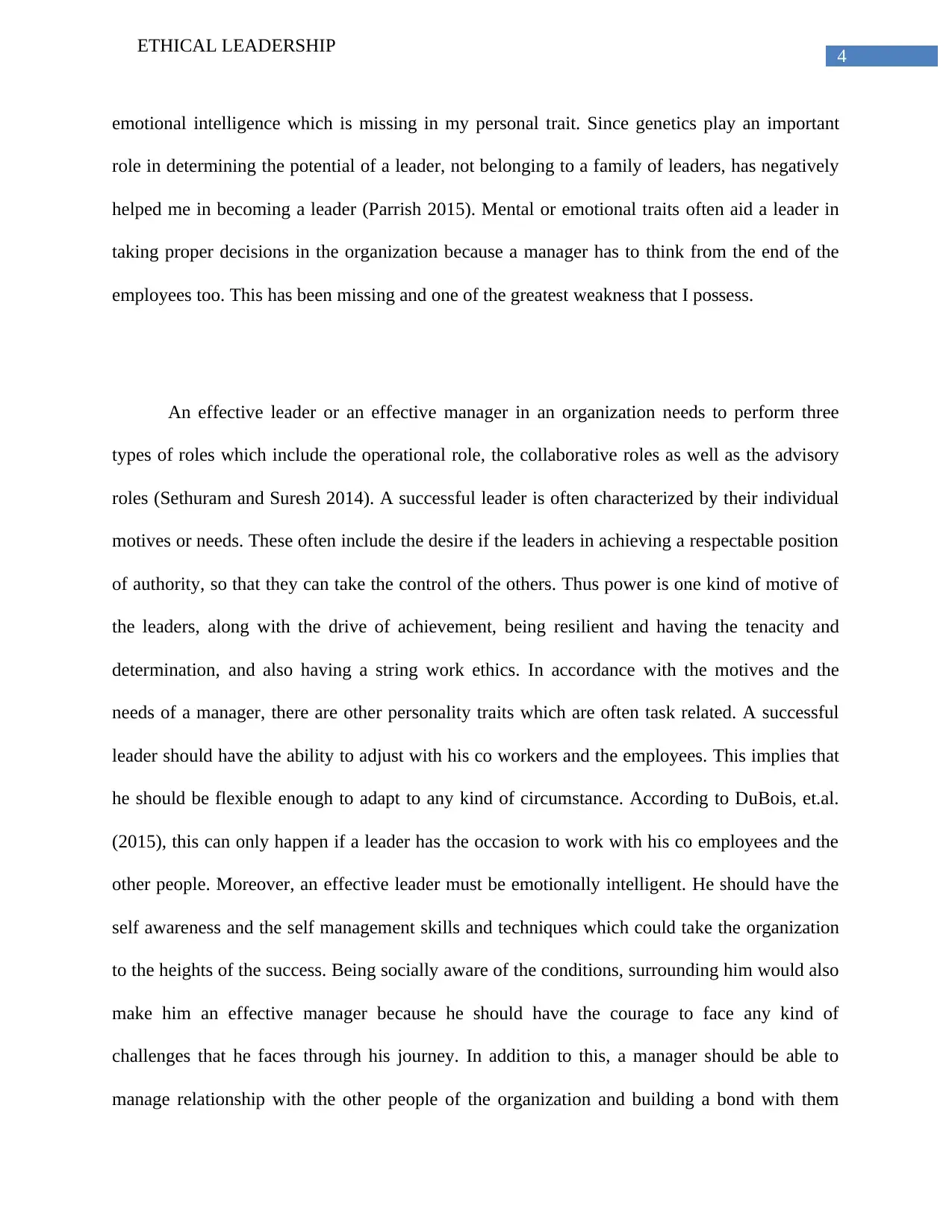
4
ETHICAL LEADERSHIP
emotional intelligence which is missing in my personal trait. Since genetics play an important
role in determining the potential of a leader, not belonging to a family of leaders, has negatively
helped me in becoming a leader (Parrish 2015). Mental or emotional traits often aid a leader in
taking proper decisions in the organization because a manager has to think from the end of the
employees too. This has been missing and one of the greatest weakness that I possess.
An effective leader or an effective manager in an organization needs to perform three
types of roles which include the operational role, the collaborative roles as well as the advisory
roles (Sethuram and Suresh 2014). A successful leader is often characterized by their individual
motives or needs. These often include the desire if the leaders in achieving a respectable position
of authority, so that they can take the control of the others. Thus power is one kind of motive of
the leaders, along with the drive of achievement, being resilient and having the tenacity and
determination, and also having a string work ethics. In accordance with the motives and the
needs of a manager, there are other personality traits which are often task related. A successful
leader should have the ability to adjust with his co workers and the employees. This implies that
he should be flexible enough to adapt to any kind of circumstance. According to DuBois, et.al.
(2015), this can only happen if a leader has the occasion to work with his co employees and the
other people. Moreover, an effective leader must be emotionally intelligent. He should have the
self awareness and the self management skills and techniques which could take the organization
to the heights of the success. Being socially aware of the conditions, surrounding him would also
make him an effective manager because he should have the courage to face any kind of
challenges that he faces through his journey. In addition to this, a manager should be able to
manage relationship with the other people of the organization and building a bond with them
ETHICAL LEADERSHIP
emotional intelligence which is missing in my personal trait. Since genetics play an important
role in determining the potential of a leader, not belonging to a family of leaders, has negatively
helped me in becoming a leader (Parrish 2015). Mental or emotional traits often aid a leader in
taking proper decisions in the organization because a manager has to think from the end of the
employees too. This has been missing and one of the greatest weakness that I possess.
An effective leader or an effective manager in an organization needs to perform three
types of roles which include the operational role, the collaborative roles as well as the advisory
roles (Sethuram and Suresh 2014). A successful leader is often characterized by their individual
motives or needs. These often include the desire if the leaders in achieving a respectable position
of authority, so that they can take the control of the others. Thus power is one kind of motive of
the leaders, along with the drive of achievement, being resilient and having the tenacity and
determination, and also having a string work ethics. In accordance with the motives and the
needs of a manager, there are other personality traits which are often task related. A successful
leader should have the ability to adjust with his co workers and the employees. This implies that
he should be flexible enough to adapt to any kind of circumstance. According to DuBois, et.al.
(2015), this can only happen if a leader has the occasion to work with his co employees and the
other people. Moreover, an effective leader must be emotionally intelligent. He should have the
self awareness and the self management skills and techniques which could take the organization
to the heights of the success. Being socially aware of the conditions, surrounding him would also
make him an effective manager because he should have the courage to face any kind of
challenges that he faces through his journey. In addition to this, a manager should be able to
manage relationship with the other people of the organization and building a bond with them
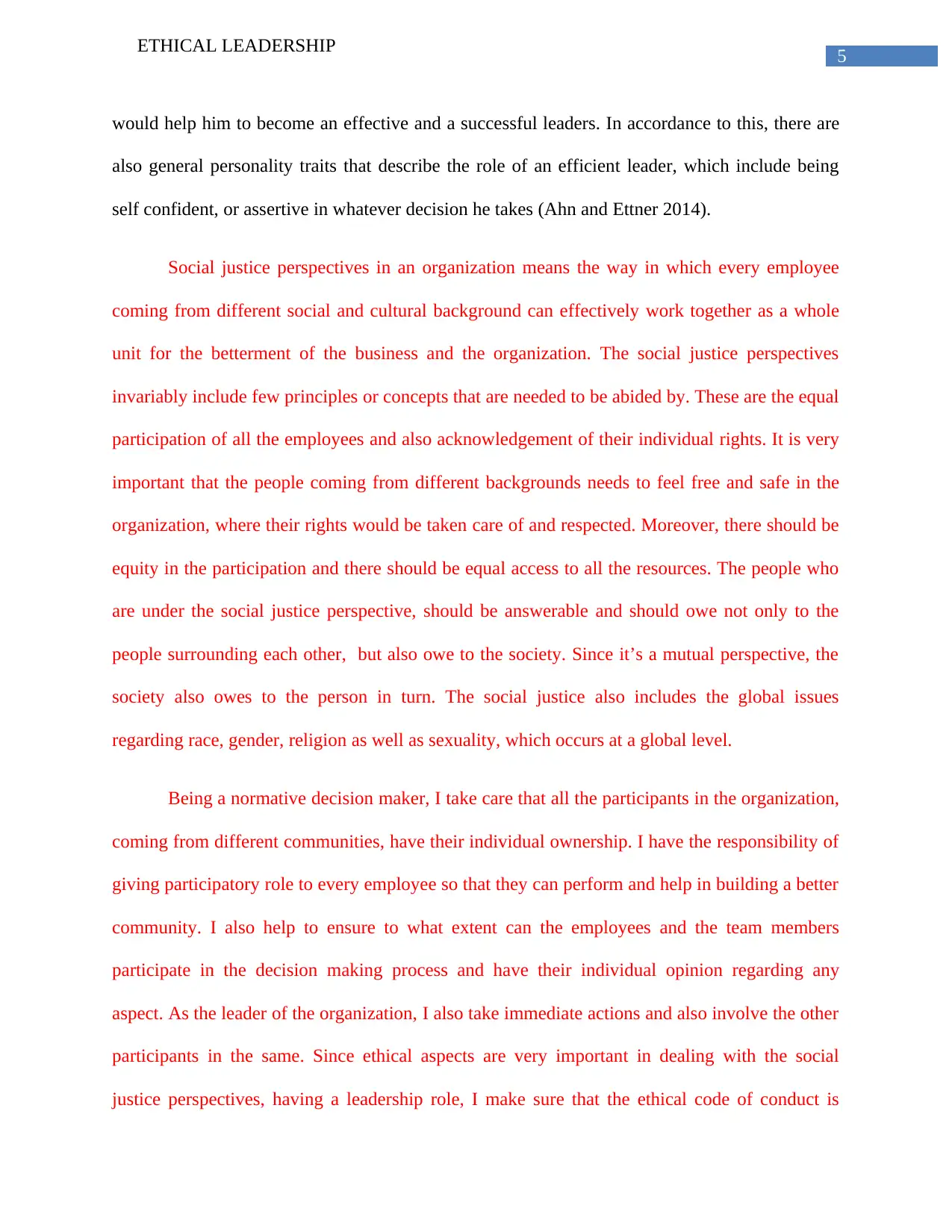
5
ETHICAL LEADERSHIP
would help him to become an effective and a successful leaders. In accordance to this, there are
also general personality traits that describe the role of an efficient leader, which include being
self confident, or assertive in whatever decision he takes (Ahn and Ettner 2014).
Social justice perspectives in an organization means the way in which every employee
coming from different social and cultural background can effectively work together as a whole
unit for the betterment of the business and the organization. The social justice perspectives
invariably include few principles or concepts that are needed to be abided by. These are the equal
participation of all the employees and also acknowledgement of their individual rights. It is very
important that the people coming from different backgrounds needs to feel free and safe in the
organization, where their rights would be taken care of and respected. Moreover, there should be
equity in the participation and there should be equal access to all the resources. The people who
are under the social justice perspective, should be answerable and should owe not only to the
people surrounding each other, but also owe to the society. Since it’s a mutual perspective, the
society also owes to the person in turn. The social justice also includes the global issues
regarding race, gender, religion as well as sexuality, which occurs at a global level.
Being a normative decision maker, I take care that all the participants in the organization,
coming from different communities, have their individual ownership. I have the responsibility of
giving participatory role to every employee so that they can perform and help in building a better
community. I also help to ensure to what extent can the employees and the team members
participate in the decision making process and have their individual opinion regarding any
aspect. As the leader of the organization, I also take immediate actions and also involve the other
participants in the same. Since ethical aspects are very important in dealing with the social
justice perspectives, having a leadership role, I make sure that the ethical code of conduct is
ETHICAL LEADERSHIP
would help him to become an effective and a successful leaders. In accordance to this, there are
also general personality traits that describe the role of an efficient leader, which include being
self confident, or assertive in whatever decision he takes (Ahn and Ettner 2014).
Social justice perspectives in an organization means the way in which every employee
coming from different social and cultural background can effectively work together as a whole
unit for the betterment of the business and the organization. The social justice perspectives
invariably include few principles or concepts that are needed to be abided by. These are the equal
participation of all the employees and also acknowledgement of their individual rights. It is very
important that the people coming from different backgrounds needs to feel free and safe in the
organization, where their rights would be taken care of and respected. Moreover, there should be
equity in the participation and there should be equal access to all the resources. The people who
are under the social justice perspective, should be answerable and should owe not only to the
people surrounding each other, but also owe to the society. Since it’s a mutual perspective, the
society also owes to the person in turn. The social justice also includes the global issues
regarding race, gender, religion as well as sexuality, which occurs at a global level.
Being a normative decision maker, I take care that all the participants in the organization,
coming from different communities, have their individual ownership. I have the responsibility of
giving participatory role to every employee so that they can perform and help in building a better
community. I also help to ensure to what extent can the employees and the team members
participate in the decision making process and have their individual opinion regarding any
aspect. As the leader of the organization, I also take immediate actions and also involve the other
participants in the same. Since ethical aspects are very important in dealing with the social
justice perspectives, having a leadership role, I make sure that the ethical code of conduct is
⊘ This is a preview!⊘
Do you want full access?
Subscribe today to unlock all pages.

Trusted by 1+ million students worldwide
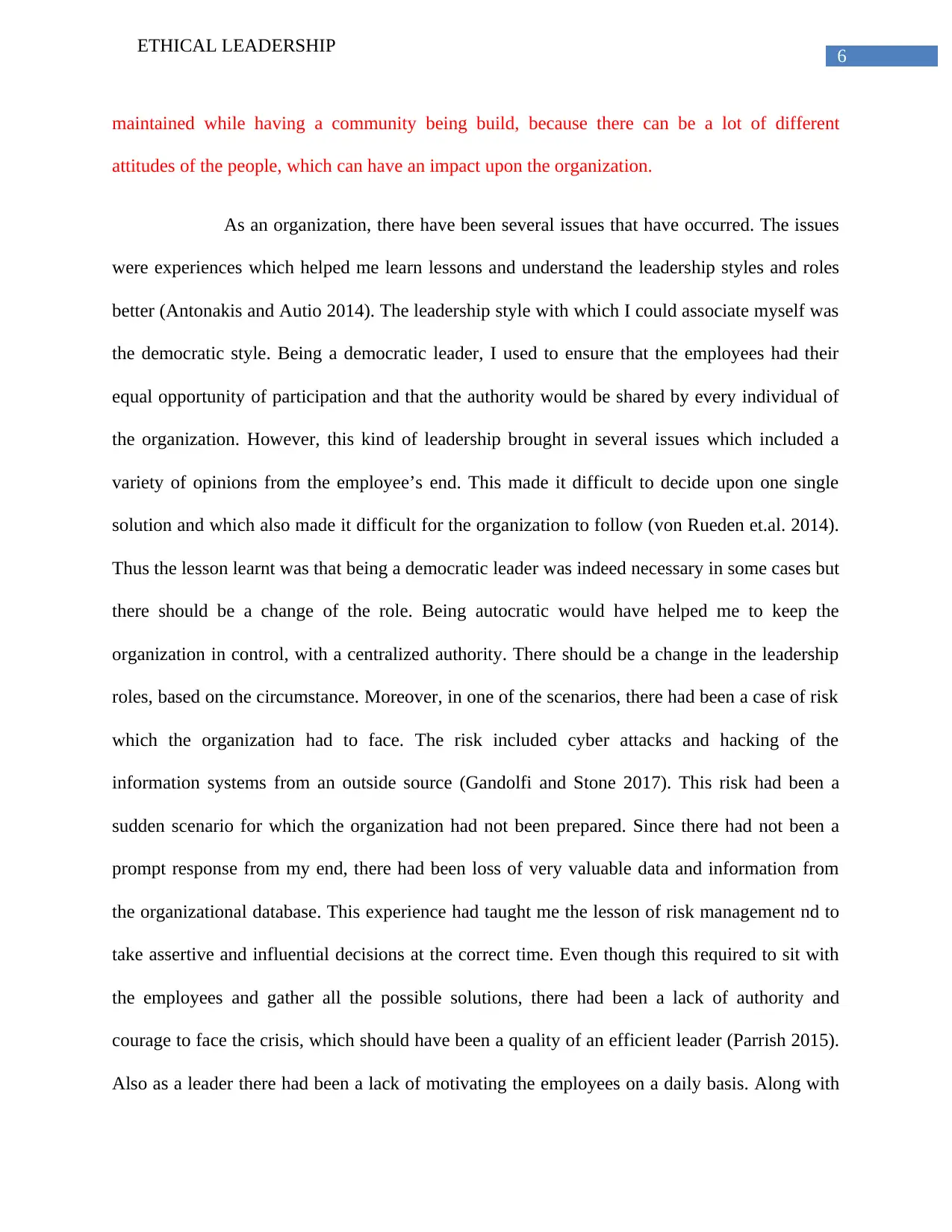
6
ETHICAL LEADERSHIP
maintained while having a community being build, because there can be a lot of different
attitudes of the people, which can have an impact upon the organization.
As an organization, there have been several issues that have occurred. The issues
were experiences which helped me learn lessons and understand the leadership styles and roles
better (Antonakis and Autio 2014). The leadership style with which I could associate myself was
the democratic style. Being a democratic leader, I used to ensure that the employees had their
equal opportunity of participation and that the authority would be shared by every individual of
the organization. However, this kind of leadership brought in several issues which included a
variety of opinions from the employee’s end. This made it difficult to decide upon one single
solution and which also made it difficult for the organization to follow (von Rueden et.al. 2014).
Thus the lesson learnt was that being a democratic leader was indeed necessary in some cases but
there should be a change of the role. Being autocratic would have helped me to keep the
organization in control, with a centralized authority. There should be a change in the leadership
roles, based on the circumstance. Moreover, in one of the scenarios, there had been a case of risk
which the organization had to face. The risk included cyber attacks and hacking of the
information systems from an outside source (Gandolfi and Stone 2017). This risk had been a
sudden scenario for which the organization had not been prepared. Since there had not been a
prompt response from my end, there had been loss of very valuable data and information from
the organizational database. This experience had taught me the lesson of risk management nd to
take assertive and influential decisions at the correct time. Even though this required to sit with
the employees and gather all the possible solutions, there had been a lack of authority and
courage to face the crisis, which should have been a quality of an efficient leader (Parrish 2015).
Also as a leader there had been a lack of motivating the employees on a daily basis. Along with
ETHICAL LEADERSHIP
maintained while having a community being build, because there can be a lot of different
attitudes of the people, which can have an impact upon the organization.
As an organization, there have been several issues that have occurred. The issues
were experiences which helped me learn lessons and understand the leadership styles and roles
better (Antonakis and Autio 2014). The leadership style with which I could associate myself was
the democratic style. Being a democratic leader, I used to ensure that the employees had their
equal opportunity of participation and that the authority would be shared by every individual of
the organization. However, this kind of leadership brought in several issues which included a
variety of opinions from the employee’s end. This made it difficult to decide upon one single
solution and which also made it difficult for the organization to follow (von Rueden et.al. 2014).
Thus the lesson learnt was that being a democratic leader was indeed necessary in some cases but
there should be a change of the role. Being autocratic would have helped me to keep the
organization in control, with a centralized authority. There should be a change in the leadership
roles, based on the circumstance. Moreover, in one of the scenarios, there had been a case of risk
which the organization had to face. The risk included cyber attacks and hacking of the
information systems from an outside source (Gandolfi and Stone 2017). This risk had been a
sudden scenario for which the organization had not been prepared. Since there had not been a
prompt response from my end, there had been loss of very valuable data and information from
the organizational database. This experience had taught me the lesson of risk management nd to
take assertive and influential decisions at the correct time. Even though this required to sit with
the employees and gather all the possible solutions, there had been a lack of authority and
courage to face the crisis, which should have been a quality of an efficient leader (Parrish 2015).
Also as a leader there had been a lack of motivating the employees on a daily basis. Along with
Paraphrase This Document
Need a fresh take? Get an instant paraphrase of this document with our AI Paraphraser
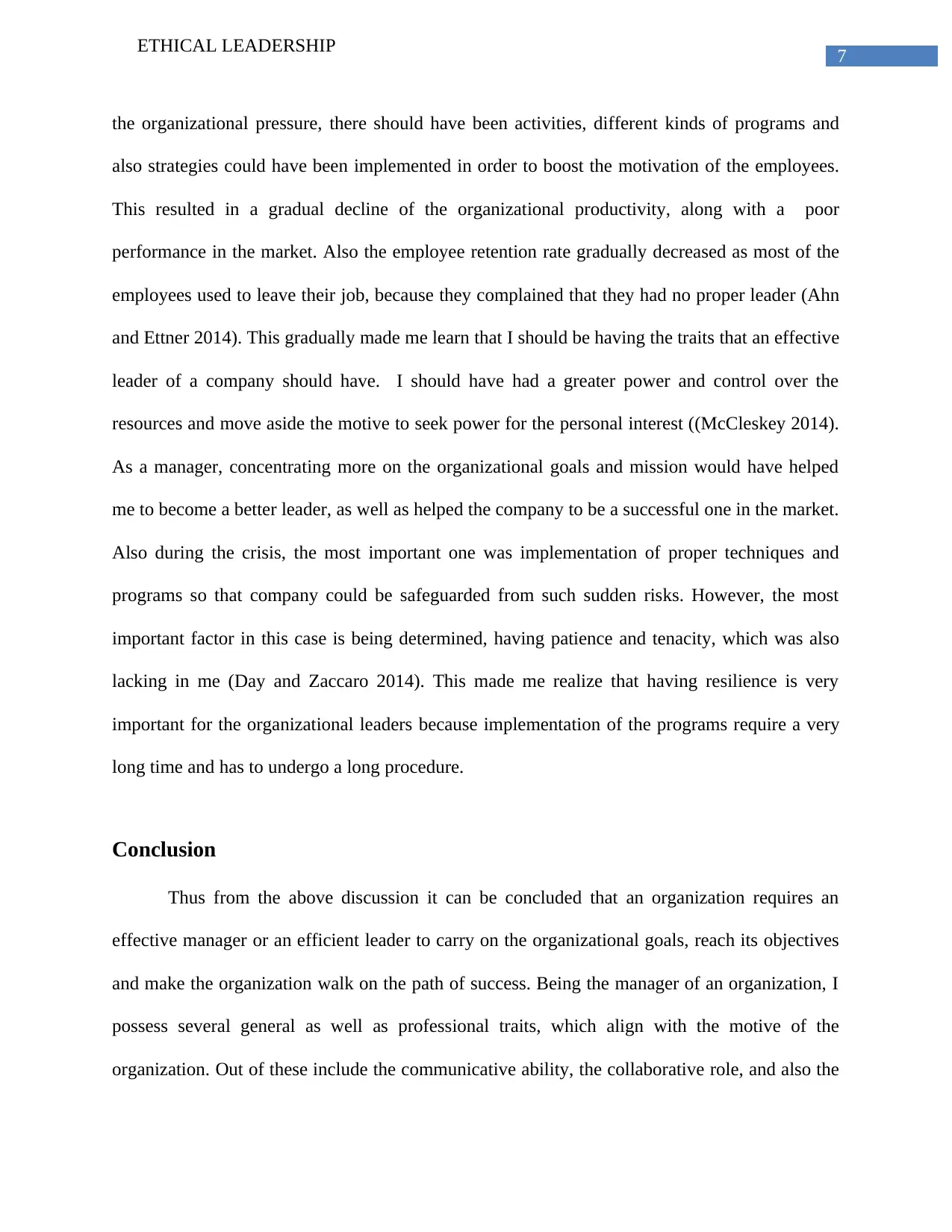
7
ETHICAL LEADERSHIP
the organizational pressure, there should have been activities, different kinds of programs and
also strategies could have been implemented in order to boost the motivation of the employees.
This resulted in a gradual decline of the organizational productivity, along with a poor
performance in the market. Also the employee retention rate gradually decreased as most of the
employees used to leave their job, because they complained that they had no proper leader (Ahn
and Ettner 2014). This gradually made me learn that I should be having the traits that an effective
leader of a company should have. I should have had a greater power and control over the
resources and move aside the motive to seek power for the personal interest ((McCleskey 2014).
As a manager, concentrating more on the organizational goals and mission would have helped
me to become a better leader, as well as helped the company to be a successful one in the market.
Also during the crisis, the most important one was implementation of proper techniques and
programs so that company could be safeguarded from such sudden risks. However, the most
important factor in this case is being determined, having patience and tenacity, which was also
lacking in me (Day and Zaccaro 2014). This made me realize that having resilience is very
important for the organizational leaders because implementation of the programs require a very
long time and has to undergo a long procedure.
Conclusion
Thus from the above discussion it can be concluded that an organization requires an
effective manager or an efficient leader to carry on the organizational goals, reach its objectives
and make the organization walk on the path of success. Being the manager of an organization, I
possess several general as well as professional traits, which align with the motive of the
organization. Out of these include the communicative ability, the collaborative role, and also the
ETHICAL LEADERSHIP
the organizational pressure, there should have been activities, different kinds of programs and
also strategies could have been implemented in order to boost the motivation of the employees.
This resulted in a gradual decline of the organizational productivity, along with a poor
performance in the market. Also the employee retention rate gradually decreased as most of the
employees used to leave their job, because they complained that they had no proper leader (Ahn
and Ettner 2014). This gradually made me learn that I should be having the traits that an effective
leader of a company should have. I should have had a greater power and control over the
resources and move aside the motive to seek power for the personal interest ((McCleskey 2014).
As a manager, concentrating more on the organizational goals and mission would have helped
me to become a better leader, as well as helped the company to be a successful one in the market.
Also during the crisis, the most important one was implementation of proper techniques and
programs so that company could be safeguarded from such sudden risks. However, the most
important factor in this case is being determined, having patience and tenacity, which was also
lacking in me (Day and Zaccaro 2014). This made me realize that having resilience is very
important for the organizational leaders because implementation of the programs require a very
long time and has to undergo a long procedure.
Conclusion
Thus from the above discussion it can be concluded that an organization requires an
effective manager or an efficient leader to carry on the organizational goals, reach its objectives
and make the organization walk on the path of success. Being the manager of an organization, I
possess several general as well as professional traits, which align with the motive of the
organization. Out of these include the communicative ability, the collaborative role, and also the
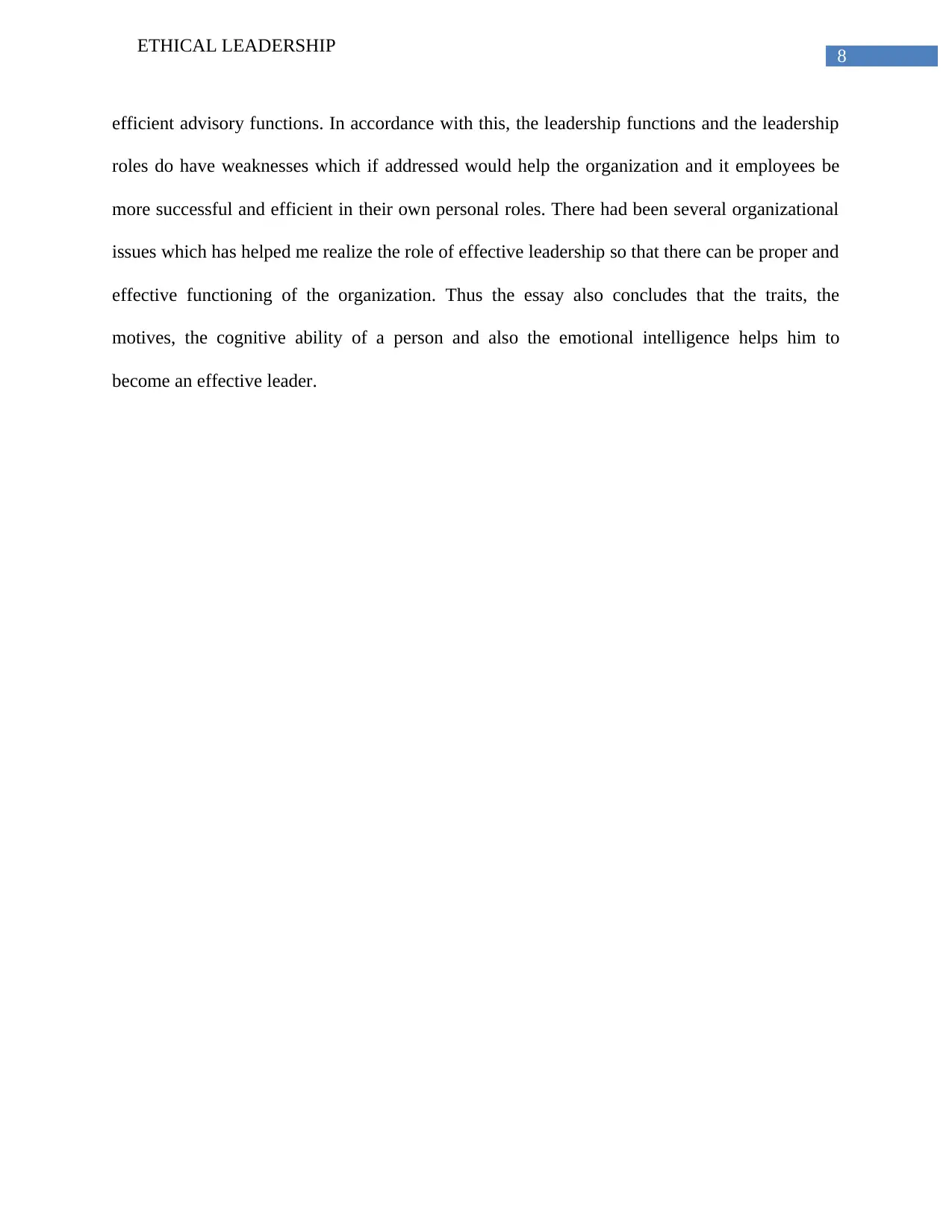
8
ETHICAL LEADERSHIP
efficient advisory functions. In accordance with this, the leadership functions and the leadership
roles do have weaknesses which if addressed would help the organization and it employees be
more successful and efficient in their own personal roles. There had been several organizational
issues which has helped me realize the role of effective leadership so that there can be proper and
effective functioning of the organization. Thus the essay also concludes that the traits, the
motives, the cognitive ability of a person and also the emotional intelligence helps him to
become an effective leader.
ETHICAL LEADERSHIP
efficient advisory functions. In accordance with this, the leadership functions and the leadership
roles do have weaknesses which if addressed would help the organization and it employees be
more successful and efficient in their own personal roles. There had been several organizational
issues which has helped me realize the role of effective leadership so that there can be proper and
effective functioning of the organization. Thus the essay also concludes that the traits, the
motives, the cognitive ability of a person and also the emotional intelligence helps him to
become an effective leader.
⊘ This is a preview!⊘
Do you want full access?
Subscribe today to unlock all pages.

Trusted by 1+ million students worldwide
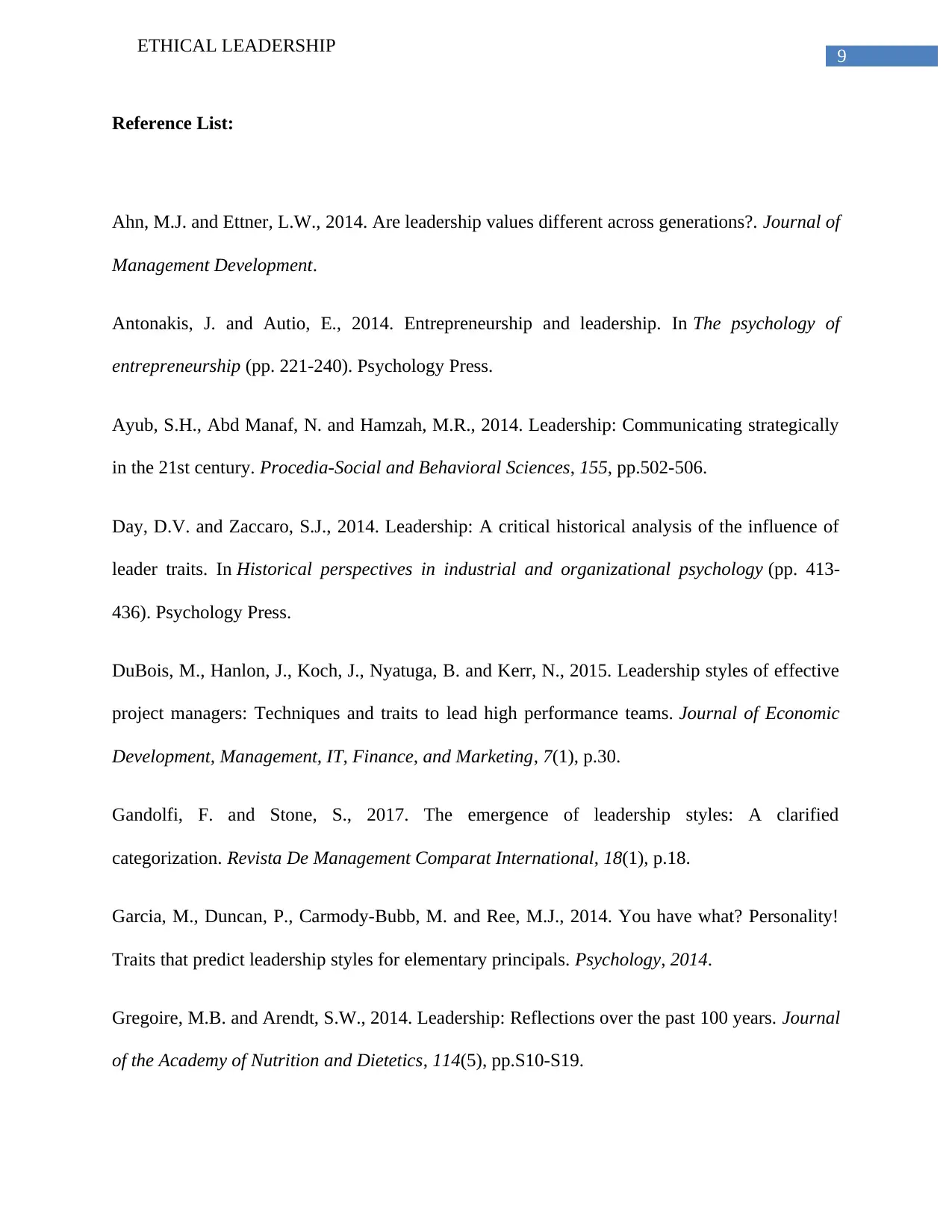
9
ETHICAL LEADERSHIP
Reference List:
Ahn, M.J. and Ettner, L.W., 2014. Are leadership values different across generations?. Journal of
Management Development.
Antonakis, J. and Autio, E., 2014. Entrepreneurship and leadership. In The psychology of
entrepreneurship (pp. 221-240). Psychology Press.
Ayub, S.H., Abd Manaf, N. and Hamzah, M.R., 2014. Leadership: Communicating strategically
in the 21st century. Procedia-Social and Behavioral Sciences, 155, pp.502-506.
Day, D.V. and Zaccaro, S.J., 2014. Leadership: A critical historical analysis of the influence of
leader traits. In Historical perspectives in industrial and organizational psychology (pp. 413-
436). Psychology Press.
DuBois, M., Hanlon, J., Koch, J., Nyatuga, B. and Kerr, N., 2015. Leadership styles of effective
project managers: Techniques and traits to lead high performance teams. Journal of Economic
Development, Management, IT, Finance, and Marketing, 7(1), p.30.
Gandolfi, F. and Stone, S., 2017. The emergence of leadership styles: A clarified
categorization. Revista De Management Comparat International, 18(1), p.18.
Garcia, M., Duncan, P., Carmody-Bubb, M. and Ree, M.J., 2014. You have what? Personality!
Traits that predict leadership styles for elementary principals. Psychology, 2014.
Gregoire, M.B. and Arendt, S.W., 2014. Leadership: Reflections over the past 100 years. Journal
of the Academy of Nutrition and Dietetics, 114(5), pp.S10-S19.
ETHICAL LEADERSHIP
Reference List:
Ahn, M.J. and Ettner, L.W., 2014. Are leadership values different across generations?. Journal of
Management Development.
Antonakis, J. and Autio, E., 2014. Entrepreneurship and leadership. In The psychology of
entrepreneurship (pp. 221-240). Psychology Press.
Ayub, S.H., Abd Manaf, N. and Hamzah, M.R., 2014. Leadership: Communicating strategically
in the 21st century. Procedia-Social and Behavioral Sciences, 155, pp.502-506.
Day, D.V. and Zaccaro, S.J., 2014. Leadership: A critical historical analysis of the influence of
leader traits. In Historical perspectives in industrial and organizational psychology (pp. 413-
436). Psychology Press.
DuBois, M., Hanlon, J., Koch, J., Nyatuga, B. and Kerr, N., 2015. Leadership styles of effective
project managers: Techniques and traits to lead high performance teams. Journal of Economic
Development, Management, IT, Finance, and Marketing, 7(1), p.30.
Gandolfi, F. and Stone, S., 2017. The emergence of leadership styles: A clarified
categorization. Revista De Management Comparat International, 18(1), p.18.
Garcia, M., Duncan, P., Carmody-Bubb, M. and Ree, M.J., 2014. You have what? Personality!
Traits that predict leadership styles for elementary principals. Psychology, 2014.
Gregoire, M.B. and Arendt, S.W., 2014. Leadership: Reflections over the past 100 years. Journal
of the Academy of Nutrition and Dietetics, 114(5), pp.S10-S19.
Paraphrase This Document
Need a fresh take? Get an instant paraphrase of this document with our AI Paraphraser
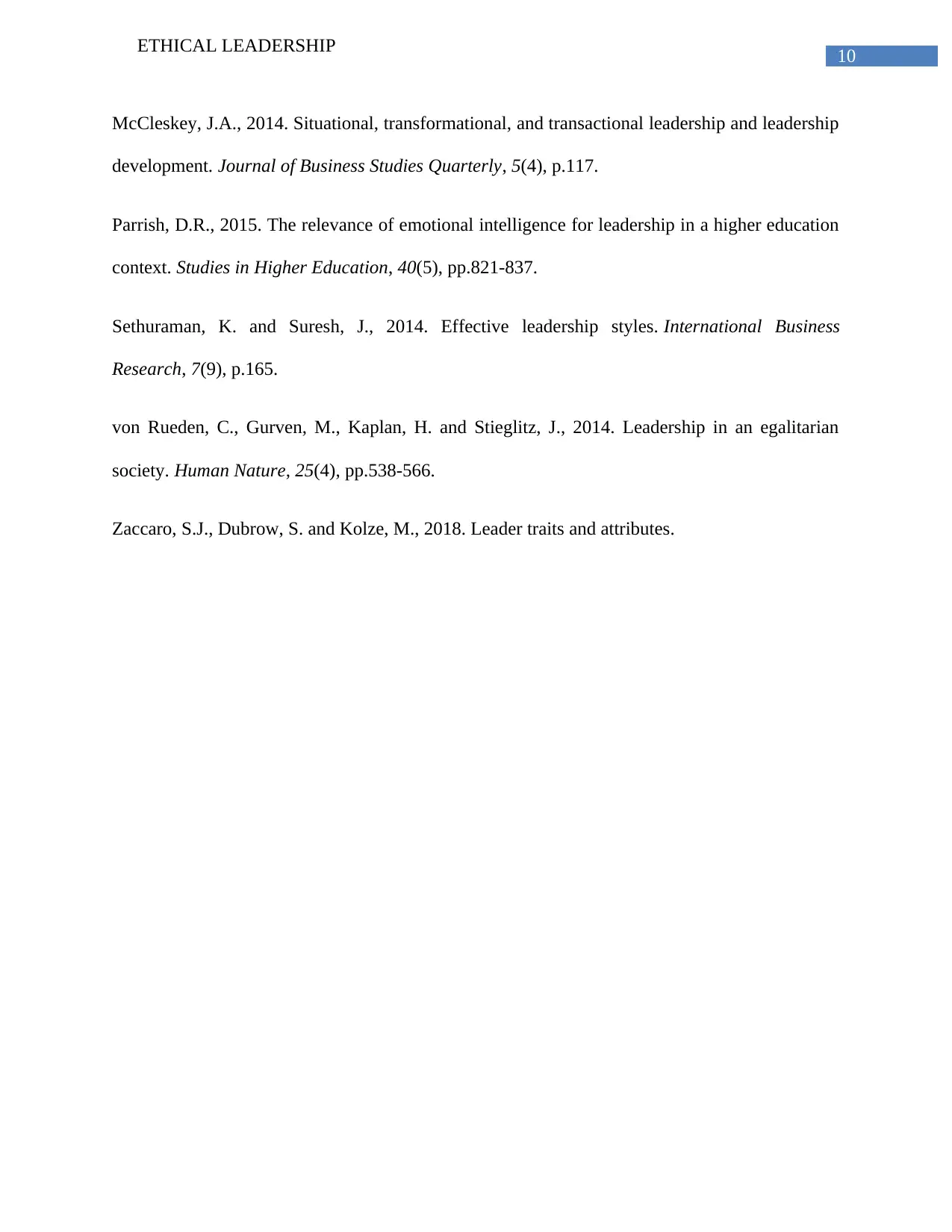
10
ETHICAL LEADERSHIP
McCleskey, J.A., 2014. Situational, transformational, and transactional leadership and leadership
development. Journal of Business Studies Quarterly, 5(4), p.117.
Parrish, D.R., 2015. The relevance of emotional intelligence for leadership in a higher education
context. Studies in Higher Education, 40(5), pp.821-837.
Sethuraman, K. and Suresh, J., 2014. Effective leadership styles. International Business
Research, 7(9), p.165.
von Rueden, C., Gurven, M., Kaplan, H. and Stieglitz, J., 2014. Leadership in an egalitarian
society. Human Nature, 25(4), pp.538-566.
Zaccaro, S.J., Dubrow, S. and Kolze, M., 2018. Leader traits and attributes.
ETHICAL LEADERSHIP
McCleskey, J.A., 2014. Situational, transformational, and transactional leadership and leadership
development. Journal of Business Studies Quarterly, 5(4), p.117.
Parrish, D.R., 2015. The relevance of emotional intelligence for leadership in a higher education
context. Studies in Higher Education, 40(5), pp.821-837.
Sethuraman, K. and Suresh, J., 2014. Effective leadership styles. International Business
Research, 7(9), p.165.
von Rueden, C., Gurven, M., Kaplan, H. and Stieglitz, J., 2014. Leadership in an egalitarian
society. Human Nature, 25(4), pp.538-566.
Zaccaro, S.J., Dubrow, S. and Kolze, M., 2018. Leader traits and attributes.
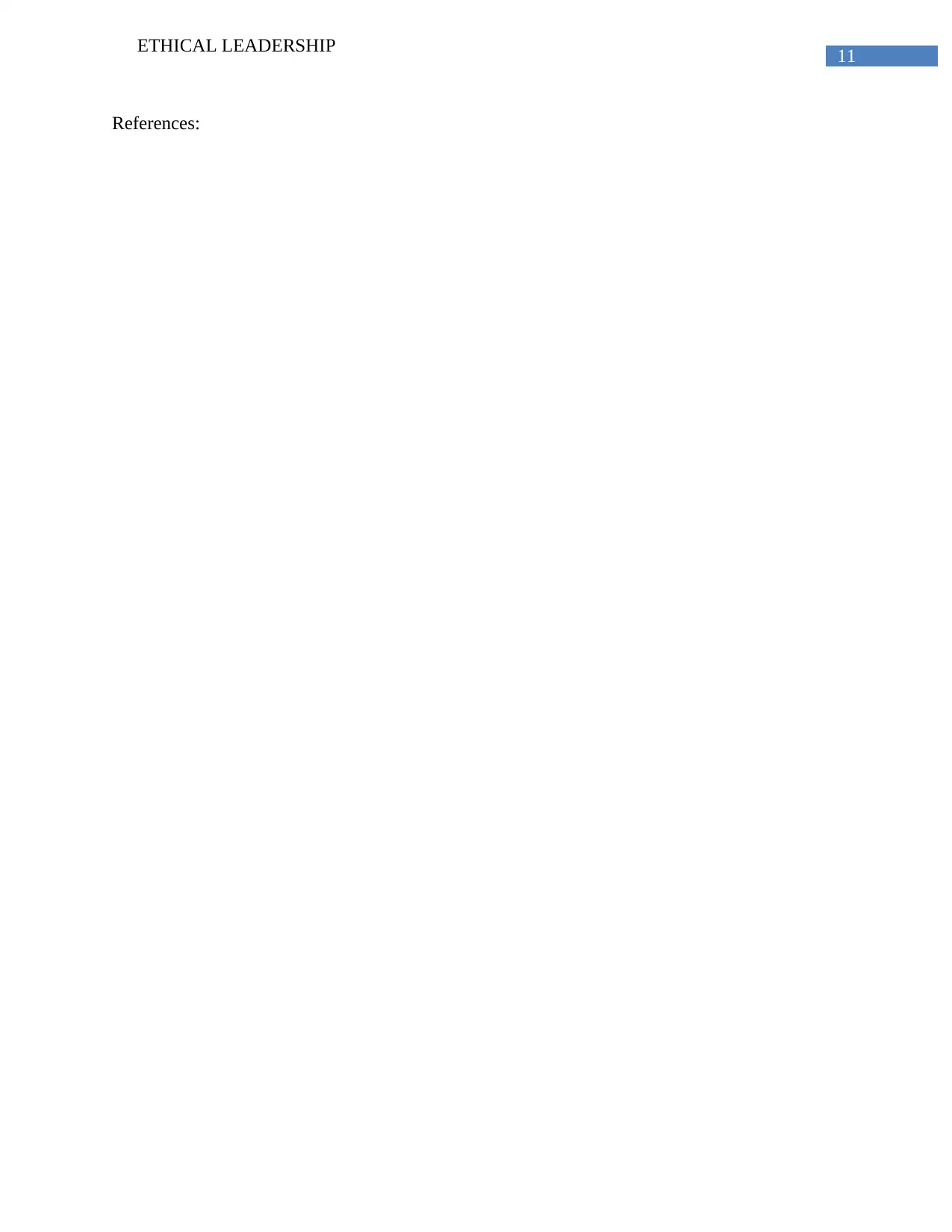
11
ETHICAL LEADERSHIP
References:
ETHICAL LEADERSHIP
References:
⊘ This is a preview!⊘
Do you want full access?
Subscribe today to unlock all pages.

Trusted by 1+ million students worldwide
1 out of 12
Related Documents
Your All-in-One AI-Powered Toolkit for Academic Success.
+13062052269
info@desklib.com
Available 24*7 on WhatsApp / Email
![[object Object]](/_next/static/media/star-bottom.7253800d.svg)
Unlock your academic potential
Copyright © 2020–2026 A2Z Services. All Rights Reserved. Developed and managed by ZUCOL.


